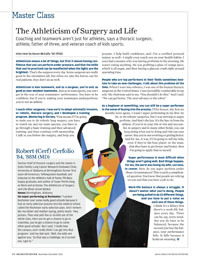Books & Recordings
Athleticism means a lot of things, but first it means having confidence that you can perform under pressure, and that the skills that you’ve practiced can be manifested when the lights are the brightest. That’s the surgeon every day. Some surgeons are really good in the simulation lab, but when we take the knives out for real patients, they don’t do as well.
Athleticism is also teamwork, and as a surgeon, you’re only as good as your weakest teammate. Just as in team sports, you can’t get in the way of your teammates’ performance. You have to be confident, but if you’re making your teammates underperform, you’re not an athlete.
 (Photo: Adam Fenster)
(Photo: Adam Fenster)I coach other surgeons. I was early to adopt minimally invasive, or robotic, thoracic surgery, and I developed a training program. Mentoring is the key. That means if I’m going to train you to do robotic lung surgery, you have to watch me and my team operate, you have to go through a basic training and then advanced training, and then continue with mentorship. I talk to you before the surgery, and help you prepare. I help build confidence, and—I’m a certified personal trainer as well—I might even coach you on your health habits. I once had a mentee who was having problems in the morning. He wasn’t eating anything. He was grabbing a glass of orange juice, which is all sugar, and then having a glucose crash right around operating time.
People who are top performers in their fields sometimes hesitate to take on new challenges. I talk about this problem all the time. When I went into robotics, I was one of the busiest thoracic surgeons in the United States. I was incredibly comfortable in my role. My chairman said to me, “You shouldn’t do this.” And I said, “We can get better. The next advance is the robot.”
Robert (Cerf) Cerfolio ’84, ’88M (MD)
Section chief of thoracic surgery and the James H. Estes Family Lung Cancer Research Endowed Chair, University of Alabama at Birmingham; former first team All-American, Yellowjackets baseball, and inductee to the Athletics Hall of Fame; Phi Beta Kappa graduate; and author of Super Performing at Work and at Home: The Athleticism of Surgery and Life (River Grove Books)
Home: Birmingham, Alabama
On super performing at Rochester: “I picked Rochester over some really good schools because it had an early selection process into the medical school called the Rochester early selection plan. And I remember my father and mother saying, pretty much, ‘Hey, jackass. They only pick five or six kids out of the whole class. Here you’ve got a chance to go to Columbia, you’ve got a chance to go to some other good schools.’ But I said, ‘I really love the campus, and I really think I can get into that program.’ And my dad said, ‘Well, the odds are against you.’ So that was a challenge. As it turned out, I got in.”
As a beginner at something, you can still be a super performer in the sense of buying into the process. I’ll be honest. My first six months were agony. I wasn’t super performing in my first 20, 30, or 40 robotic surgeries, but I was striving to super perform. And that’s the key. It’s the buy-in from the athlete. If you’re in your 50s or 60s and successful, in surgery and in many other fields, you can keep doing what you’re doing and ride out your career. But you’re not evolving or getting better. And for me, it was, if I’m going to tell my kids, even if they’re the best player on the team, that they have to get better and better, then I’m going to apply that to myself.
Super performance is most difficult when things aren’t going well. Bad things happen. For me, the worst was losing my wife, Lorraine, to cancer. How do you super perform under those circumstances? This is such a complicated question. You know that people are relying on you and that you have a job to do.
Work-life balance is always a struggle. It doesn’t matter what you’re doing. People are being pulled to do 25 different things. And you have to put a value on each one of those things. I think it’s a fallacy that there’s a work-life balance every day. There can be, say, every week. But you do have to be balanced, because the second you lose the balance, your performance falls. It falls because it holds no meaning.

